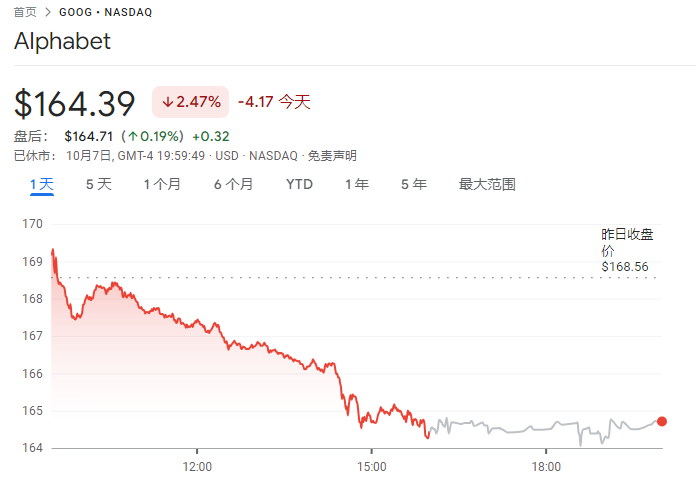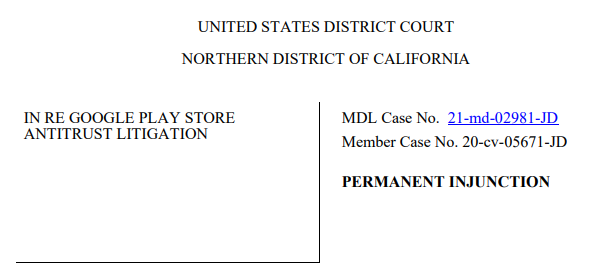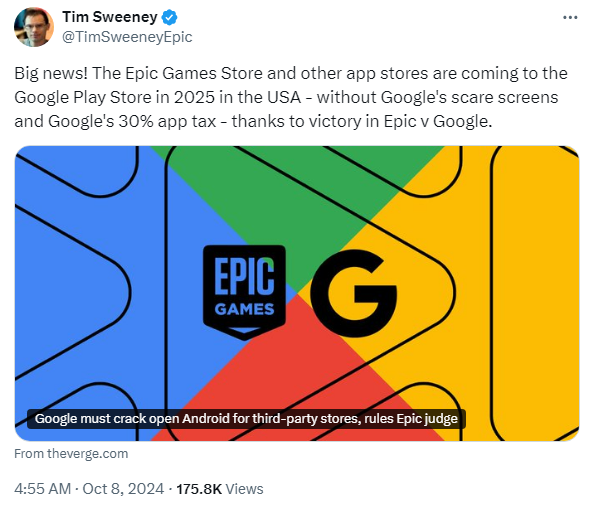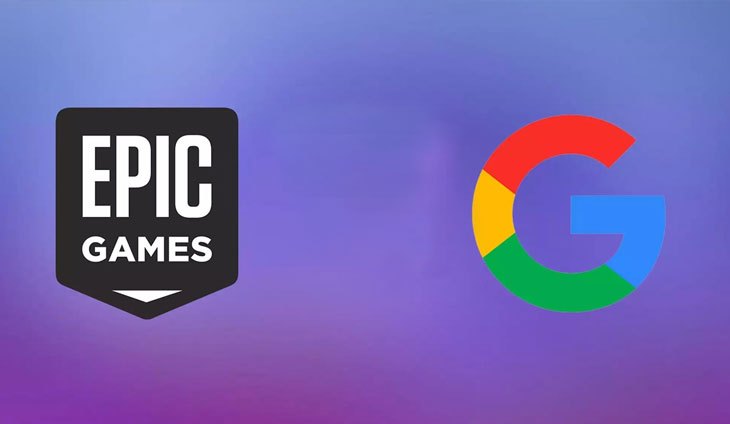U.S. Court Forces Google to Keep "Doors Wide Open"
On October 7, Judicial Council of California ruled that Google must open its Google Play Store to competitors starting November 1, 2024, for a period of three years, and must not engage in any anti-competitive behavior.
On October 7, Judicial Council of California Judge James Donato issued a final ruling in the long-standing antitrust lawsuit filed by game developer Epic Games against Google.
The ruling determined that Google's Android app store, Google Play, engages in illegal monopolistic practices. The company must allow competitors' Android apps to access the Google Play Store within three years of the ruling taking effect. Additionally, Google must permit competitors' Android app stores to access the app directory of the Google Play Store, unless developers choose to opt out. Google is also prohibited from paying developers to withdraw from competition with the Google Play Store.
The injunction will take effect on November 1, giving Google time to adjust its agreements and practices accordingly. However, Google subsequently announced that it would appeal the ruling and seek a stay on the enforcement of this injunction. The company argues that the ruling overlooks the competitive landscape between Apple and Android.
Following this news, Alphabet, Google's parent company, saw its stock price decline by 2.47% on that day, closing at $164.39.

According to the specific document, from November 1, 2024, to November 1, 2027, Google must:
- Allow competitors' Android app stores to access the app directory of the Google Play Store;
- Incorporate third-party Android app stores within its Google Play Store.
Additionally, Google is prohibited from:
- Paying companies to exclusively or preferentially launch apps on the Google Play Store;
- Paying companies to avoid competition with the Google Play Store;
- Paying companies to pre-install the Google Play Store on new devices;
- Requiring app developers to use Google Play billing services, or preventing app developers from setting up cheaper online channels on their websites.
Judge James Donato also specified that Epic Games and Google will establish a three-member technical committee, with each side appointing one member, and those two members jointly selecting a third member, to oversee technical compliance.

Industry insiders say this injunction will significantly encourage competition among Android app stores, providing app developers with a larger market share and reducing software listing fees.
In the past, Google and Apple's app stores typically took a 15% to 30% cut of total sales from high-revenue applications. Sensor Tower data shows that consumer spending on apps reached $124 billion in 2023.
After the injunction was issued, Epic Games CEO Tim Sweeney pointed out that it means all app developers, store manufacturers, and operators have three years to build a vibrant and competitive Android ecosystem, a process that Google cannot prevent.

Nevertheless, it is evident that Google will still retain some control over the security of the Google Play Store, allowing it to take reasonable measures to address issues, but these measures must be "strictly necessary and targeted" and comparable to how Google currently manages the Google Play Store. Google may also charge fees for these management measures.
Epic Games previously expressed hope that the judge would extend the validity of the injunction from three years to six years, and that users could easily sideload apps with a simple button press, while also requesting Google to stop bundling Android APIs with the Google Play Store.
In response, Judge James Donato explained, "These provisions aim to provide a fair competitive environment for competitors without imposing an undue burden on Google. As competition enters the market, the unfair advantages gained by Google Play through network effects will diminish, and Google as a competitor should not face excessive restrictions."
Earlier, Epic Games' popular game "Fortnite" was swiftly removed from the store for bypassing the 30% fee charged by Google and Apple, triggering a series of antitrust battles.

On August 13, 2020, Epic Games formally filed a lawsuit, accusing Google of monopolizing app access and in-app transactions on Android devices. The same day, it also appealed against Apple, but the "Apple case" was resolved quickly in favor of Apple, with the U.S. Supreme Court dismissing Epic Games' final appeal in January of this year.
Google has not been so "fortunate." In December last year, a jury unanimously ruled that Google's app and payment channels constitute illegal monopolistic behavior. In August of this year, Judge James Donato again rejected Google's defenses, stating, "Dismantling the relevant barriers is an inevitable outcome."
Last week, Epic Games filed a second lawsuit against Google and Samsung, arguing that the two companies are attempting to evade the impending injunction by increasing the operational complexity of third-party app stores. This case is related to the current one and will also be overseen by Judge James Donato.
·Original
Disclaimer: The views in this article are from the original Creator and do not represent the views or position of Hawk Insight. The content of the article is for reference, communication and learning only, and does not constitute investment advice. If it involves copyright issues, please contact us for deletion.